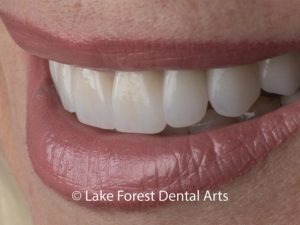
What are veneers?
Veneers are very thin shells that are bonded to the tooth. The thin shells cover the fronts of teeth and literally transform your smile. They can mask cosmetic problems or enhance the size and shape of your teeth. The treatment is very customizable. Advances in dentistry allow the shells to be made so thinly that they can be placed without the need for removing enamel. The veneers, especially porcelain veneers, are also very strong.
Having very thin shells may seem like a problem for the veneering process. In theory, thinner porcelain would be more likely to crack or break. The special material used to make our advanced shells will not easily become damaged. The benefits include avoiding uncomfortable drilling. Traditional veneers require enamel to be removed. With no-prep shells, you are ready to resume normal activities right after they are placed. When patients ask, “What are veneers?” they may have the option confused with other cosmetic options we offer.
Bonding offers similar (but not as dramatic) results. The special material is reflective like enamel and can be shaped to meet your personal needs and goals. Dr. James Fondriest will be glad to discuss the pros and cons of this treatment option. In general, bonding does not last as long as veneers and requires replacement every several years. Both treatments will last longer with proper brushing and flossing.
What are veneers made from?
Veneers are typically made from porcelain or composite material. Composite resin is more affordable. The resin can be molded to deliver beautiful results. The substance can also be matched to blend with the color of your enamel. This option may allow you to forgo drilling. Traditional veneers require some enamel to be removed to make room for the shells. People with a crooked smile usually require some enamel reduction. If you have a crooked tooth, the protruding part of your tooth can be shaved so the final results are more even and straight.
Dr. Fondriest is a big believer in conservative treatments. Any changes to your teeth will be minimal. The most conservative option we offer is no-prep veneers. If you have straight teeth and do not suffer from gum recession, you can enjoy this unique option. The conservative option simply places the cosmetic shell over the tooth.
Either material choice can deliver great results. Porcelain or composite veneers are good options for anyone who has:
- Small or misshapen teeth
- Gaps between teeth or close diastemas
- Crooked, cracked, or chipped teeth
- Stained or discolored teeth

Beautiful smile makeover done with porcelain tooth covers.
What can they fix?
Veneers are very useful at hiding dental imperfections. If you have minor cosmetic issues like chips or gaps, composite resin may work best to restore tooth structure. For almost all other cosmetic problems, a veneer can brighten your smile. One benefit that many people are not aware of is fixing gaps. We tend to think of braces as being the only option for crooked or gapped teeth. In many cases, veneers cost less and are faster than braces.
A gap between your teeth can be fixed using one or more cosmetic shells. A dentist can create shells that reach across the gap to improve your smile. One benefit of this option is that is does not take much time. In as only a few visits to our office, your gap can become a thing of the past.
Stained teeth can be extremely embarrassing. Surface stains can often be addressed through whitening treatments. A good whitening toothpaste can also remove surface stains. Deeper stains may need to be covered up. The material that the shells are made from can hide unwanted stains. Even if you do not suffer from dental stains, the aging process can leave natural teeth looking more yellow. As we age, the thickness of our enamel diminishes. The underlying dentin is more yellow in color. the dentin becomes more visible as we grow older.
Some people have teeth that are small or misshapen. Other people may have small teeth due to grinding. No matter why your teeth appear small, the cosmetic shells can deliver a fuller, more attractive smile.
Conservative options
Our office is proud to offer minimal and no-prep options. The no-prep versions do not require changes to your enamel. Composite veneers (which are tooth colored) also are conservative.
In some cases, tooth enamel must be prepared. If your teeth do require prepping, it is often due to crooked teeth. Any part of your tooth that sticks out will need to be slightly drilled down. Some patients may be fitted with temporary veneers at first.
What are veneers not good for addressing?
There are certain situations where a veneer may not be the best option. The cosmetic option works best when there is healthy enamel available to place the shells over. If you have suffered from large decay, gum disease, or other dental problems, you can still be fitted with a crown. The restorative caps can be placed on any tooth surface.
Porcelain crowns require that a fair amount of enamel is removed. This means that the treatment is not reversible. Our doctor will be glad to explain the pros and cons of this option. If your smile is very crooked, braces or Invisalign may be a better option to meet your needs.
Schedule Your Consultation Today
Now that you are no longer wondering, “What are veneers?” you can take the next step by contacting our dental practice. Our friendly dental team is waiting to transform your smile. Dr. Fondriest has decades of professional experience helping good candidates gain a smile that they can be proud of.
To learn more about this dental procedure and what type of veneer works best for you, call (847) 234-0517.
